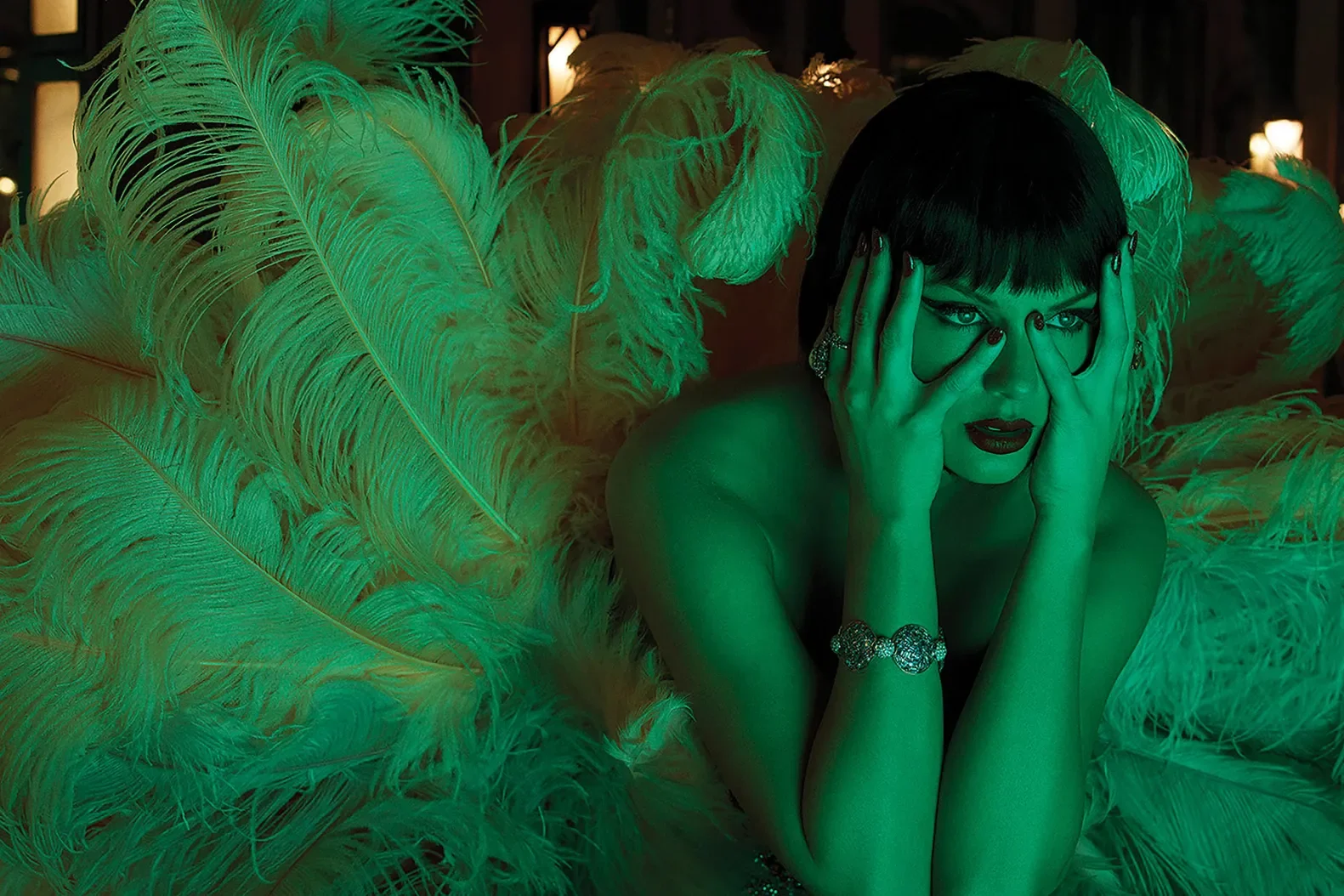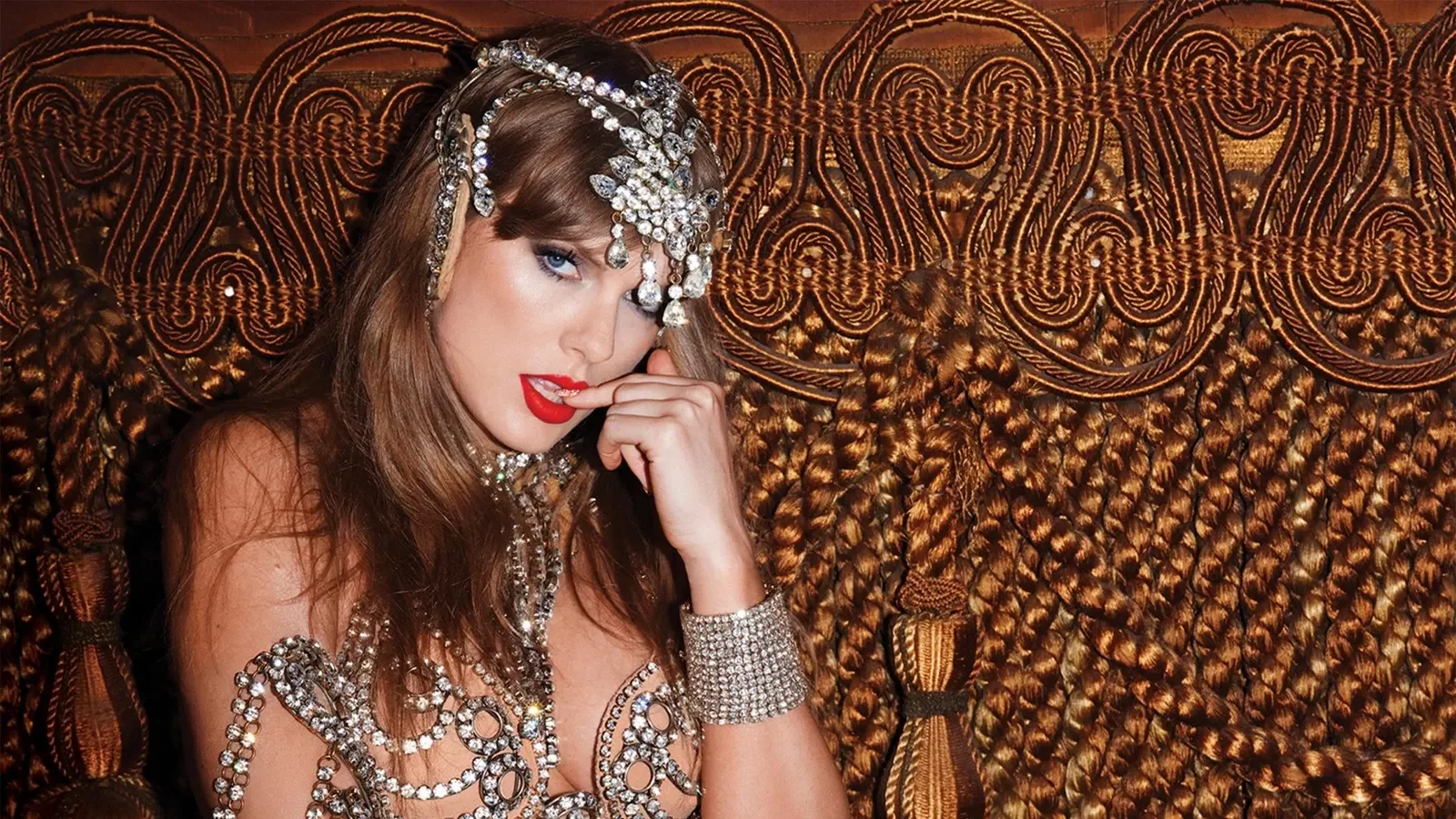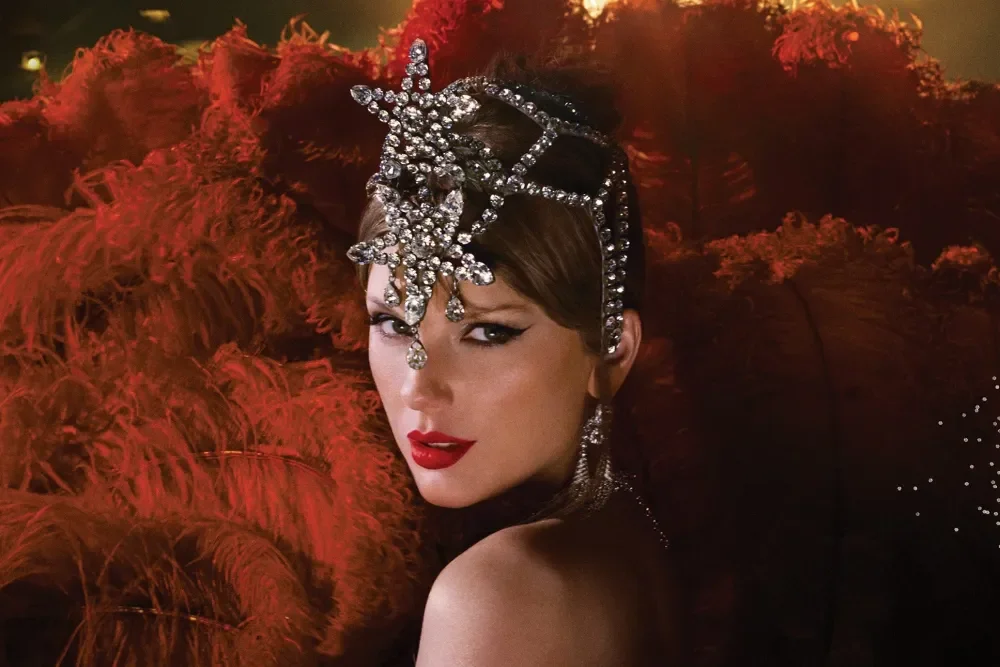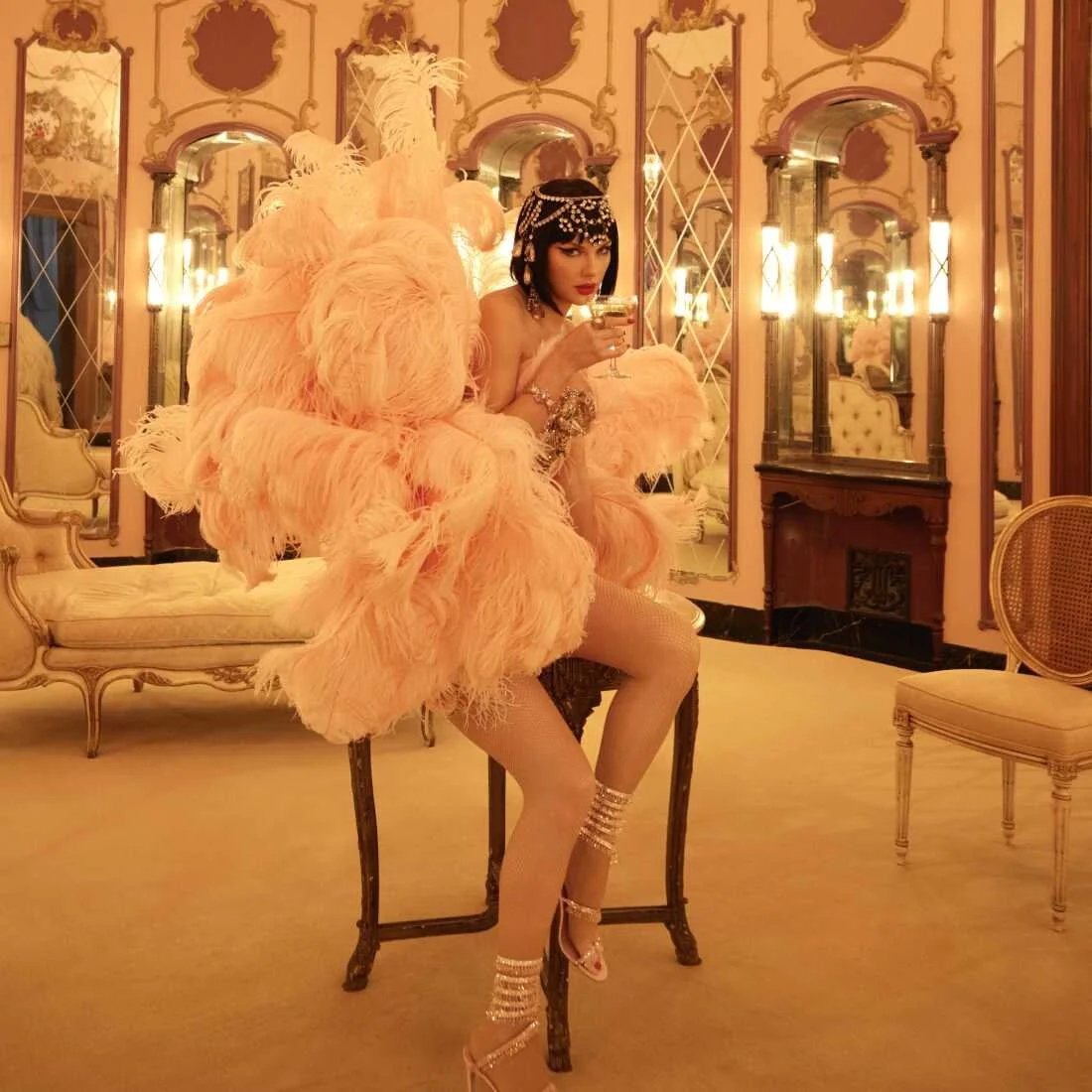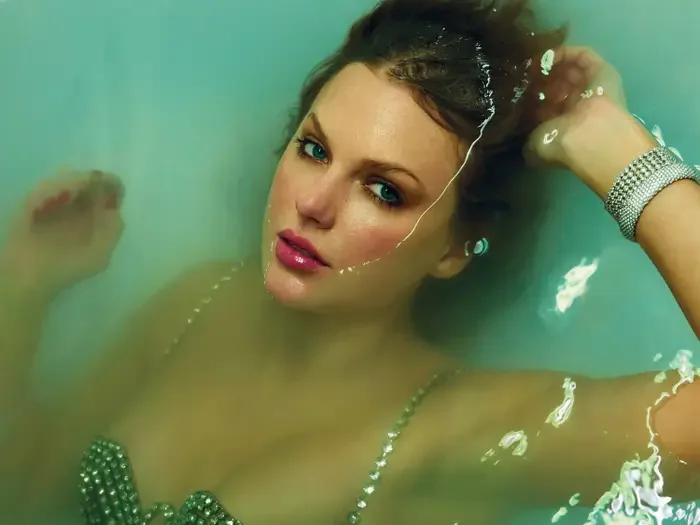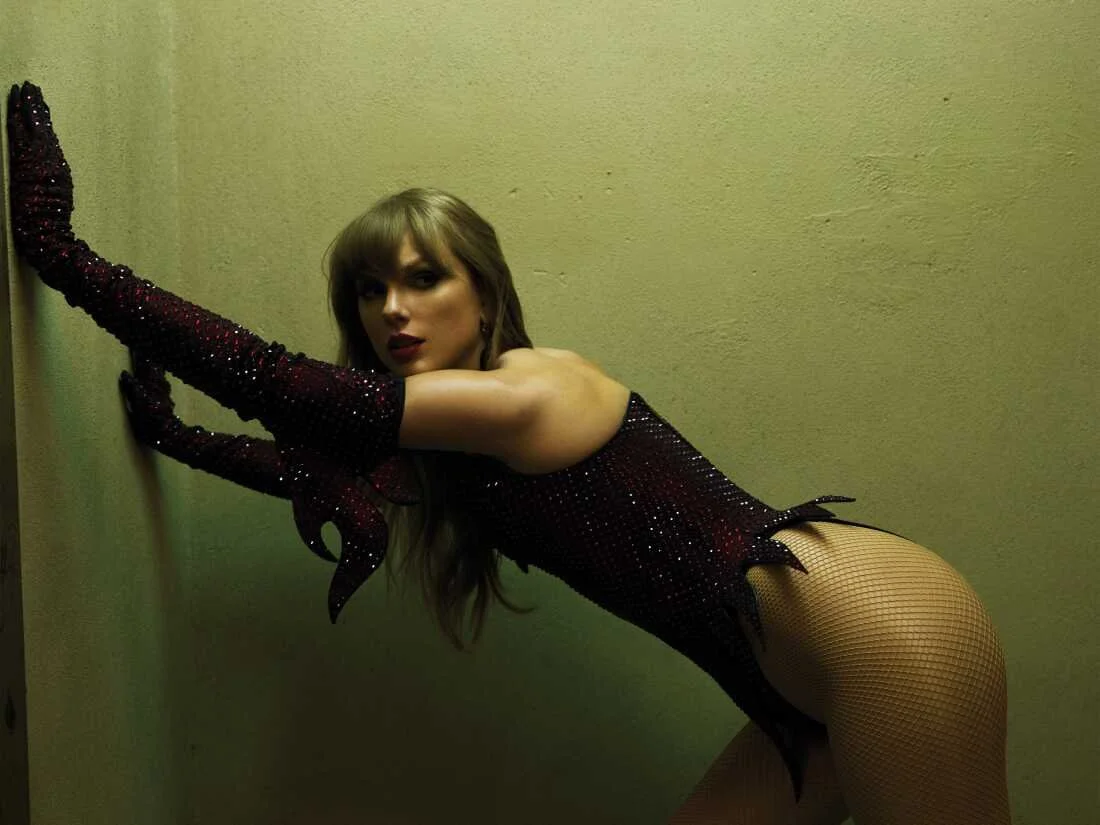Sequins Can’t Hide the Silence: Taylor Swift’s Hollowest Album Yet
Photo Curtsey of Mert Alas and Marcus Piggott
Taylor Swift’s Life of a Showgirl is more like Life of a Billionaire High School Mean Girl. This should have been a daring, self-aware pop reinvention. Instead, it lands like a lifeless brand exercise – petty, watered-down, and strangely hollow for an artist who made heartbreak cinematic and rebellion feel personal. From cheap shade at singer, Charli XCX, to awkward, try-hard sexuality, the record doesn’t sound like it came from one of the most celebrated songwriters alive. It sounds like if AI-generation had a good PR team.
A Masterclass in Marketing, a Failure in Music
The rollout was intoxicating: moody showgirl visuals shot by Mert Alas and Marcus Piggott, glittery costuming, and an aesthetic that promised bite and glamour. Swift’s fans were ready for an era dripping with danger, camp, and maybe even some sexy grown-woman grit. What we got was a pop album so sanitized by the algorithm – it feels built for grocery store playlists.
Produced by Max Martin – the architect behind pop icons such as Katy Perry, The Backstreet Boys, and Brittney Spears – Showgirl somehow manages to sound flat and simply uninteresting. Choruses meander. Swearing feels like checkbox rebellion. Sexual references are cringy enough to make you wince. It’s not that Swift has to stay “the girl next door,” but if you’re going to step into sex and power, you need to bite – but instead she nibbled and backed away with her tail between her legs.
Photo Curtsey of Mert Alas and Marcus Piggott
Teenage Angst in Billionaire Clothing
Swift is 36 now – but lyrically, this album feels like a moody Tumblr post from 2013. Honestly, even those were spicier reads. Her earlier work wielded heartbreak with precision; even Reputation had fangs under the gloss of Pop music. Here, we get petty digs and hollow empowerment.
“Actually Romantic,” a track believed to be aimed at Charli XCX, plays like an Instagram subtweet turned into a song. Charli’s hit song, “Sympathy is a Knife” from her album BRAT was written about Swift – the song wrestles with the weight of Taylor Swift’s success and how it makes Charli feel small in comparison. She sings, “I couldn’t even be her if I tried, I’m opposite, I’m on the other side” — a raw confession of the pressure to measure up. The track isn’t a direct attack; it’s Charli unpacking what it means, as a woman in music, to constantly compare yourself and feel like you’ll never be ‘just as good’ as the industry’s biggest names. Swift’s response? A weirdly sexual, mean-girl clapback that feels neither clever or cutting – it’s just uncomfortable. When Swift tosses out a line like “it’s kind of making me wet” when referring to how much Charli XCX supposedly talks and thinks about her, it doesn’t read as witty; more like a rich popular girl reminding everyone who’s on top. The energy is pure “hey little coke-head, sorry you’re not as skinny, blonde, and tall as me” – more bullying than barbed artistry.
What makes it worse is how wildly off-brand it is for someone who’s built her empire on sisterhood and solidarity among women in music. Charli’s “Sympathy Is a Knife” wasn’t even a diss – it was an honest, vulnerable admission of how exhausting it feels to measure yourself against pop’s biggest machine. Instead of meeting with empathy or even silence like Lorde and Charli XCX did on the track, “Girl, So Confusing” where the two artists squashed their beef via girlhood and understanding, Swift punches down. It’s the opposite of girlhood: a billionaire superstar mocking a fellow artist’s insecurities while playing into industry hierarchies. For an album fans were expecting to be empowering, this track just reinforces the very gatekeeping and competitiveness women in the music industry have been trying to dismantle for years. This diss track wasn’t successful – it honestly just gave Charli XCX more reasoning for why she wrote “Sympathy is a Knife.”
The highly-anticipated title track, “The Life of a Showgirl” with Sabrina Carpenter – a collaboration fans have been dying to see ever since Carpenter’s big blow-out in the music industry was another that completely missed the mark. This collaboration could have been a campy, decadent pop-explosion yet fizzles into stomp-clap pop filler. Sabrina, cheeky and effortless, manages to breathe some life into the track, but the song itself squandered opportunity.
Sex, Swearing, and the Hollow Edge
It’s not revolutionary for Swift to explore sexuality as we saw on one of her previous albums, Midnights. It’s just that she does it here with the awkward energy of a corporate brand trying to “get edgy.” Explicit lyrics should feel liberating or dangerous; here; they feel like manipulative strategy. You can almost hear the boardroom conversation: “Let’s make her swear more – it’ll feel authentic.”
And here’s the bigger truth: Swift isn’t an outsider anymore and honestly never has been. She’s a billionaire with billionaire friends, engaged to an NFL player with Big Pharma sponsorships. That’s not a moral failure – it’s just reality. But it’s still impossible to ignore how disconnected this music feels from the grit and hunger that made her so magnetic. Once she wrote songs that clawed their way out of heartbreak and ambition; now, it’s luxury pop dressed as rebellion. Why is that though?
Maybe the intimacy that once fueled her songwriting – the heartbreaks, the coming-of-age scars, the conversations about grooming and power-imbalances, the moments where she openly called out toxic men in the industry, even the pro-queer rallying cry of “You Need to Calm Down” — has faded because her life no longer resembles the struggles that built her audience. She’s not fighting to be heard anymore; she’s a billionaire who vacations with other billionaires, who’s preparing to marry an NFL superstar. What does this new version of Taylor have in common with the average listener – the kids crying over a messy breakup, the young queer fans searching for safety nets within her music, the woman trying to survive in a misogynistic industry?
Her music used to bite and punch upward – now it feels like it’s floating above us in a glossy, watered-down bubble. This album feels safe and disconnected from the messy human stakes that once gave her tracks grit. It’s rebellion without risk- and fans can feel the distance.
From Folklore’s Brilliance to This
Many fans online anticipated the album to be like 1989 and Folklore mixed together. Folklore was layered, poetic, intimate – proof that Swift could evolve from diary pop into something profound and literary. Life of a Showgirl feels like the opposite: empty calories dressed in feathers. It’s safe while pretending to be risky, market-tested while masquerading as raw.
Fans didn’t need perfection; they needed truth. Instead we got aesthetic baited – glossy photos, campy promises, and an album that is all surface and no soul.
Maybe this is what happens when an artist who built her empire on outsider storytelling becomes the most powerful insider in music. But it’s still sad to witness – hell I’m writing this article with a taylor swift tattoo on my ribcage. Taylor swift doesn’t have to stay heartbroken to make good art – but she has to feel something. And Life of a Showgirl sounds like she feels nothing.
In the end, this album feels hollow. You can hear it in every watered-down chorus and bland hook – she feels nothing. Gone is the artist who once turned heartbreak into poetry and anger into anthems. In her place is someone who shrugs at politics, shrugs at accountability, shrugs at women lower on the totem pole, and surrounds herself with billionaires who’ve been called out for harm – and doesn’t seem to care.
For an artist who once positioned herself as a voice for women, for the queer kids, for anyone fighting to take up space, this record feels like a retreat into privilege. No teeth, no flight, no empathy – Just safe, frictionless pop dressed in sequins. And maybe that’s the real heartbreak here: Taylor Swift no longer sounds like she’s living life with us — she sounds like she’s watching from a penthouse window, untouched, unbothered, and unwilling to risk a thing.
Written by Emily (Mily) Ward | October 3, 2025

